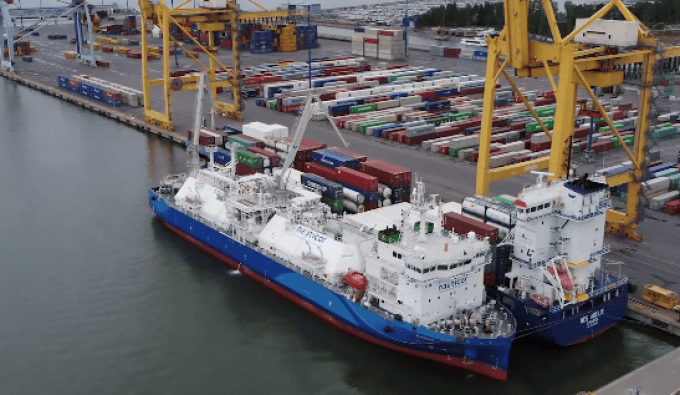Container spot rates have peaked as all major trades see prices fall
There was more evidence in this week’s container port freight markets that peak prices on ...
TFII: SOLID AS USUALMAERSK: WEAKENINGF: FALLING OFF A CLIFFAAPL: 'BOTTLENECK IN MAINLAND CHINA'AAPL: CHINA TRENDSDHL: GROWTH CAPEXR: ANOTHER SOLID DELIVERYMFT: HERE COMES THE FALLDSV: LOOK AT SCHENKER PERFORMANCEUPS: A WAVE OF DOWNGRADES DSV: BARGAIN BINKNX: EARNINGS OUTODFL: RISING AND FALLING AND THEN RISING
TFII: SOLID AS USUALMAERSK: WEAKENINGF: FALLING OFF A CLIFFAAPL: 'BOTTLENECK IN MAINLAND CHINA'AAPL: CHINA TRENDSDHL: GROWTH CAPEXR: ANOTHER SOLID DELIVERYMFT: HERE COMES THE FALLDSV: LOOK AT SCHENKER PERFORMANCEUPS: A WAVE OF DOWNGRADES DSV: BARGAIN BINKNX: EARNINGS OUTODFL: RISING AND FALLING AND THEN RISING

Having lost significant business as a consequence of the Russian invasion of Ukraine, commercial feeder operators in North Europe face reduced transhipment demand, together with the increasing threat of ocean carrier customers operating their own services.
According to a new Alphaliner survey, MSC still dominates the intra-European carrier market, with a one-third share, although CMA CGM had the greatest capacity growth in the 12 months to February.
The consultant found both carriers had increased capacity in the period, despite the war in Ukraine reducing service capacity by 1.2%.
MSC upped its capacity from 309,696 teu to 316,868 teu, giving it a 32.6% market share, while CMA CGM’s capacity (including its Containerships shortsea and feeder subsidiary) went from 146,988 teu to 157,561 teu, representing 16.2% of the market.
According to Alphaliner, the French carrier has 100 ships deployed on its intra-European network, the average size having increased from 1,470 teu to 1,575 per teu in the past year.
“Unlike other carriers which have eliminated entire services to and from Russia, CMA CGM has either shifted tonnage to intra-Europe services or replaced Russian calls with other ports in the Baltic or in the Black Sea region,” it said.
Meanwhile, Maersk’s intra-European capacity, including its soon-to-be-retired Sealand brand, decreased from 113,890 teu to 109,985 teu, for an 11.3% market share.
“The Danish line has removed almost 4,000 teu of capacity as it either withdrew entire services calling at Russia or cut parts of existing services calling to the Russian Baltic and Black Sea coast,” said Alphaliner.
Cosco group is in fourth place in the market share league table, with its intra-European capacity virtually unchanged during the period, at 64,788 teu, which is equivalent to 6.7% market share.
Unifeeder is the largest independent feeder operator, occupying fifth place in the intra-Europea table, but has paired down its capacity from 61,057 teu to 45,872 teu, for a 4.7% market share.
Alphaliner noted that Unifeeder had rationalised its North Europe services to the Baltic region, off-hiring five 1,100 teu to 1,600 teu ships deployed on its network.
Elsewhere, commercial feeder rival X-Press, also reduced the capacity it deploys in North Europe from 32,383 teu to 26,514 teu, reducing its market share to 2.7%, according to the analysis. Peel Ports-owned North Sea and Irish Sea feeder specialist BG Freight managed to maintain its capacity offering, at 13,953 teu, for a 1.4% market share.
Both MSC and CMA CGM have been very active in the second-hand container vessel market over the past two years, with, for instance, the former’s purchases on the S&P market now approaching 300 ships since August 2020, many of which are in the smaller sizes, which can be deployed for relay connections within its network.
Notwithstanding MSC’s ramping up of standalone services outside of the 2M Alliance, as the notice period on the vessel-sharing agreement runs down, the carrier is also busy reworking its feeder connections and recently replaced a slot agreement from Cork to Antwerp that it had with Irish Continental Group shortsea and feeder subsidiary Eucon with its own vessel.
Comment on this article